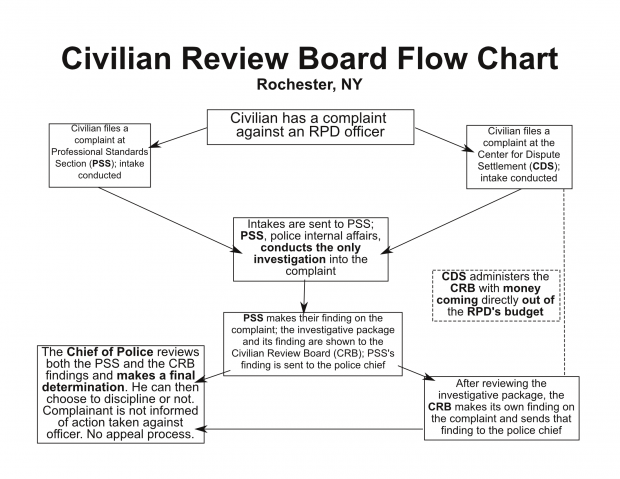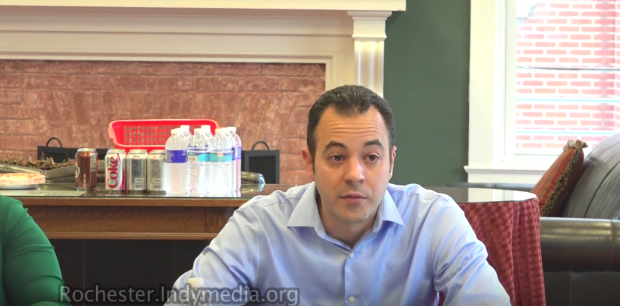Joey Lipari on Syracuse's Citizen Review Board
Primary tabs
On November 13, 2015, the administrator of Syracuse, NY's Citizen Review Board, Joey Lipari, was invited by Rochester's Coalition for Police Reform to give a presentation on how their board works.
What makes the Syracuse model interesting, is that a) it's close to Rochester and within New York State, b) it has administrative subpoena power, which it can use without going through hoops, and c) it conducts a parallel and independent investigation, next to the police investigation, of all complaints.
Rochester's current Civilian Review Board, or CRB, lacks subpoena power, independent investigations (the police conduct the only investigation), and the final determinations of complaints and disciplining of officers is vested in the hands of the chief of police--regardless of findings from the Civilian Review Board. In short, our Civilian Review Board was built to fail to the people of Rochester.
Watch Mr. Lipari's presentation below:
How Rochester's Civilian Review Board works:
Below is a flow-chart of what the current process is for a civilian wanting to make a complaint against a Rochester Police Department officer:
Step 1: Write down, in chronological order, all that you can remember from the incident. Images, identiying features, what happened, tone of voice, dialogue or commands, injuries, etc. Write down everything! Sign and date it. This can be used in civil suits against the city and the officers and also keeps the event fresh as after a traumatic experience our bodies try to repress the trauma and forget what happened.
Step 2: You've reached out to an advocacy group like Enough Is Enough or the Coalition for Police Reform and have been able to get community support. You decide you want to file a complaint against the officer(s) involved in the misconduct. Great. Before going in to do the intake, you should know that in most cases, the police end up being exonerated. This is because the way the Civilian Review Board determins police misconduct is by looking at police policies and procedures--not human or civil rights. If you have outstanding criminal charges, it is not advisable to go through with this process as the police investigator will contact the assistant district attorney about the complaint. Anything you say can be used against you in court. But as long as you know that, and you've spoken with a lawyer or an advocacy organization, feel free to go forward.
Step 3: You can make complaints at a few different places around the city, but, to keep it simple, you have two, main routes when doing an intake: Professional Standards Section, or PSS, (the Rochester Police Department's internal affairs) or the Center for Dispute Settlement, or CDS, (the non-police option for making a complaint). CDS is the nonprofit corporation that the city contracts with to administer the Civilian Review Board. In either case, whether you file with PSS or CDS (and you can only file with one or the other), that intake and any statements or information about the incident that you provide is sent to PSS for investigation.
Step 4: PSS recieves the intake and calls you to come down and participate in an interview. There is what's called a "community advocate." However, the title for this position is a misnomer: the "community advocate" is required to maintain a strict stance of neutrality. They will explain the process and re-state police questions, but they do not actually speak or act on behalf of the complainant. Some former complainants have called this an interrogation, not an interview. A sergeant will meet with you, explain the process, and take your statement. Part of the investigation includes getting statements from witnesses, interviewing the named officer(s), checking police records, finding video, etc. During this interview, in the one I sat in on and others I've heard about, PSS will try to trip you up, question you on very specific details, find out what happened before and after the incident, and sometimes use the opportunity to fish for information about other cases. The whole process is very Orweillian and not without the gut-wrenching feeling that there is a definite conflict of interest: police policing themselves. Of course, the folks down at PSS (and CDS) will tell you that their goal is integrity of the system.
Step 5: At the end of this process, PSS will put together what it calls an "investigative package." It will include your statement and all the other information mentioned above. You, the complainant, are not allowed to see any of it except for your statement. PSS breaks down the complaint into allegations. There can be multiple allegations in a complaint. They will then make a finding on each allegation: exonerated (the officer followed procedure), sustained (the officer's actions were unlawful), unprovable (there is not enough evidence to prove the allegation), and unfounded (the incident did not occur). See, for example, PSS's investigative summary in Benny Warr's ongoing case. The investigative package and their findings are sent to the chief of police for his final determination. The investigative package is also sent to the Civilian Review Board for review.
Step 6: The investigative package is transmitted electronically to the CRB panelists to review on computers set up by PSS in a designated secure room in City Hall. The three panelists, drawn from a pool of possible panelists, complete feedback forms, finding sheets, allegation sheets, and logs. They may include comments by individual panelists, such as why they disagree with their peers. The CRB cannot conduct its own investigation. Panelists vote to determine the CRB’s recommendation to the chief of police: again, exonerated, sustained, unprovable, and unfounded. The chair then calls PSS and leaves a voicemail message of their recommendation at the PSS office. The voicemail is converted to email and sent to the PSS stenographer, who transcribes it and sends it to the chief. There is no record of panelists’ deliberations—no recording nor stenographic account is filed with the city. There is no independent verification of the accuracy or quality of this process.
Step 7: The chief reviews the CRB finding as well as the PSS finding and makes a final determination on any action to be taken in response to the complaint. The determinations he can make are: exonerated, sustained, unprovable, and unfounded. The complainant receives a letter from the chief as to this determination. Any subsequent discipline is handled by the Chief: the CRB has no power to discipline officers. The chief’s letter may state that an officer was disciplined or more likely that the RPD is taking the matter seriously, but neither the complainant, the CRB, nor the public can gain access to any records to understand why an officer was or was not disciplined and what discipline, if any, was administered. Finally, there is no formal, codified appeal process in the legislation.
This does not bar the complainant from filing a Notice of Claim for a civil lawsuit against the city and the officer(s) involved in the incident.
Current Civilian Review Board documentation for Rochester & Syracuse: City Council legislation presented by Wade S. Norwood for the creation of a Civilian Review Board (1992) | By-laws for the Syracuse CRB | Syracuse CRB Policies and Procedures for Complaints | Syracuse CRB Panel Hearing Policies and Procedures
Related Stories: REMOVE THE CLOAK OF SECRECY! POLICE TRANSPARENCY NOW! | Civilian Review Board built to fail Benny Warr and other complainants | Professional Standards Section: How they work (at least on paper) | A brief history of the Police Advisory Board from 1963 - 1970 | Exonerating police misconduct: no accountability in Benny Warr case | Pass OUR community safety act now, before another Ferguson happens | Reverend Stewart on What's Hot with Howard Eagle | RPD Civilian Review Board Should Have Investigative Power and Authority | Rev. Stewart gives a teach-in on Independent Civilian Review Boards | Dredging Up the Past on Police Union President Mike Mazzeo | The Civilian Review Board Commission Recommendations Leaves Out the Civilian | Community Members Testify at Commission to Review and Reform the Civilian Review Process | Rush Transcript of McFadden Memo | Rochester Calls for New Independent Civilian Review Board After October 7th Police Riot | Commentary: Why are we reliving issues of 1964 in 2004?











